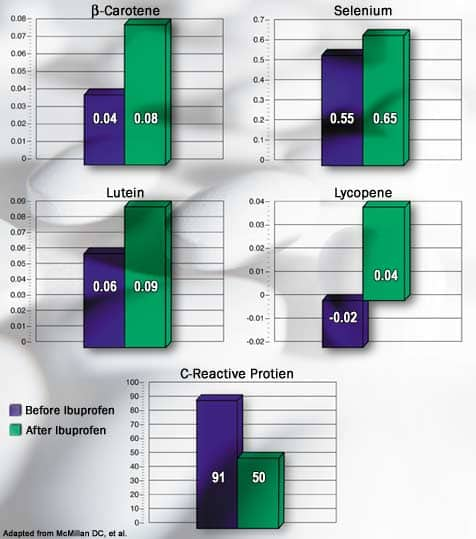Life Extension Magazine®
Common, over-the-counter drugs that inhibit inflammation may have benefits no one ever dreamed of a few years ago.
Non-steroidal anti-inflammatories (NSAIDs) are the new darlings of science. These drugs are showing up in studies on cancer, Alzheimer's disease, and more. NSAIDs interfere with the body's ability to generate eicosanoids, substances that create oxidative stress and tissue damage. Suppressing eicosanoids appears to do a lot more than stop pain, redness and swelling. Eicosanoids are involved in a host of important processes, including stress response, blood flow and pain sensation.
Scientists have discovered that blocking certain eicosanoids can also reduce tumor growth and slow Alzheimer's disease. Now comes research showing that NSAIDs can enhance levels of antioxidant vitamins and minerals. Researchers at the Royal Infirmary in Glasgow have found that the common NSAID, ibuprofen, can help normalize antioxidant levels in people with cancer. The findings have implications not just for cancer, but for any condition where eicosanoids are elevated, such as aging, or even simple exercise.
The study involved a dozen people with gastrointestinal cancer and elevated C-reactive protein (a marker for inflammation). Each person took 1200 mg of ibuprofen a day for two weeks. At the start of the study, patients' levels of antioxidant vitamins plus zinc, iron and selenium were significantly decreased–in some cases less than half of that found in the healthy control group. Levels of copper were significantly increased.*
After two weeks of ibuprofen, levels of lutein, lycopene and b-carotene, selenium and iron increased significantly, while C-reactive protein dropped by almost half. This drop is very noteworthy. C-reactive protein is found in the brains of Alzheimer's patients, and is also associated with heart attacks. Copper didn't budge (but might have had the study lasted longer). Alpha-tocopherol, which was drastically decreased in the cancer patients, did not respond to ibuprofen treatment.
Ibuprofen's mode of action was not determined, but the most obvious explanation is that by reducing the amount of inflammation-induced free radicals, the drug was able to conserve the body's antioxidant supplies. This is great news–especially for cancer patients where both antioxidant status and inflammation index may impact on recovery. Studies show that both can predict mortality in these patients.
Ibuprofen is an older NSAID that blocks two enzymes. These enzymes, known as cyclooxygenase-1 (COX-1) and cycloxygenase-2 (COX-2), catalyze the production of prostaglandin-type eicosanoids. By blocking them, ibuprofen blocks inflammation. But COX-1 is important for maintaining the lining of the stomach and kidney function. So a new generation of anti-inflammatories that only suppress COX-2 have been developed. The most well-known of these drugs is Celebrex. It and other COX-2 inhibitors are projected to be the biggest-selling drugs of the next decade partly because of their potential use in cancer. However, a lot of the new studies coming out on NSAIDs use the old stand-by, ibuprofen. Ibuprofen is sold under various brand-names, including Advil, Motrin and Nuprin. There are many other NSAIDs, including indomethacin and naproxen. These may also have benefit in maintaining antioxidant reserves. (Note that acetaminophin is not an NSAID).
*Copper and zinc are like two ends of a see-saw. Increasing zinc will generally bring copper down and vice-versa. Decreased levels of zinc are associated with lymphoma.
Ibuprofen and Cancer
 |
Ibuprofen Decreases Toxic C-Reactive Protien And Increases Beneficial Antioxidants In Cancer Patients
References
Eichholzer M, et al. 1996. Prediction of male cancer mortality by plasma levels of interacting vitamins: 17-year follow-up of the prospective Basel study. Int J Cancer 66:145-
Falconer JS, et al. 1995. Acute phase protein response and survival duration of patients with pancreatic cancer. Cancer 75:2077.
Iwamoto N, et al. 1994. Demonstration of CRP immunoreactivity in brains of Alzheimer's disease: immunohistochemical study using formic acid pretreatment of tissue sections. Neurosci Lett 177:23-26.
McMillan DC, et al. 2000. Changes in micronutrient concentrations following anti-inflammatory treatment in patients with gastrointestinal cancer. Nutrition 16:425-428.
McMillan DC, et al. 1995. A prospective study of tumour recurrence and the acute phase response after apparently curative colorectal cancer. Am J Surg 170:319.
Melchior JC, et al. 1999. Malnutrition and wasting, immunodepression and chronic inflammation as independent predictors of survival in HIV-infected patients. Nutrition 15:865-9.
Wallberg-Jonsson S, et al. 1999. Extent of inflammation predicts cardiovascular disease and overall mortality in seropositive rheumatoid arthritis. A retrospective cohort study from disease onset. J Rheumatol 26:2562-71.
